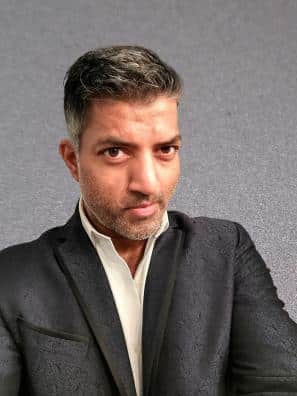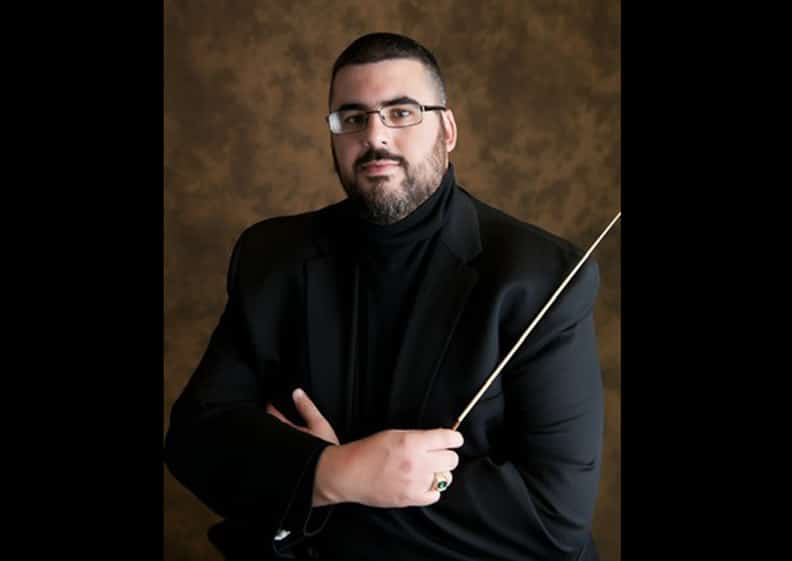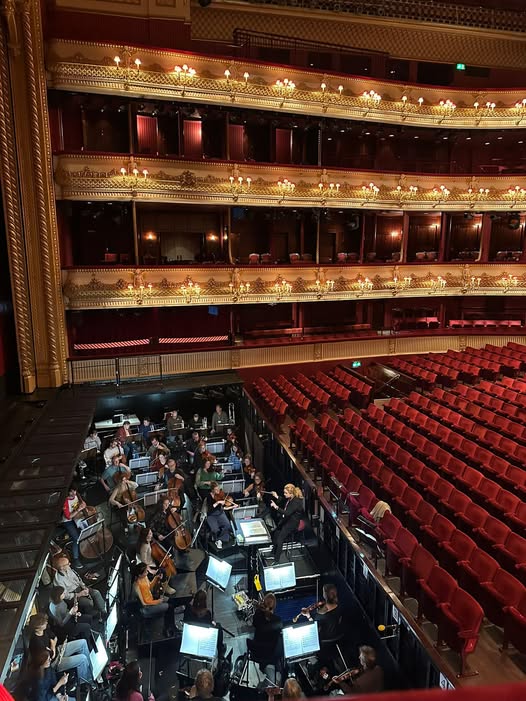El Sistema enthusiast writes its obituary
OrchestrasThe Iowa academic Jonathan Govias who was one of the early enthusiasts for the Venezuelan music education system has now pronounced its death:
Sistema was born in the late 1990s in Venezuela as a strategy of dubious ethics to elicit government funds earmarked for social purposes for what was really an initiative of unconcealed cultural colonization entirely contrary to the historic roots and modern ambitions of the nation...
Read on here.
Govias is Professor in the Music & Theatre department at Iowa State University.






Mr. Lebrecht, I am not nor have I ever been a publicist for El Sistema. An “early enthusiast”, yes. Your headline suggests a formal relationship that does not exist, and I imagine the Fundamusical Símon Bolívar would object to that as much as I do.
Hmmmm, maybe not a publicist, but:
Dr. Jonathan Andrew Govias is a conductor, consultant and educator for el Sistema programs on four continents.
A member of the inaugural class of Abreu Fellows at New England Conservatory, he has established an international reputation for his thoughtful, pragmatic and experience-based insights into el Sistema theory and practice, delivering keynote ad- dresses at Royal Festival Hall (UK), Salvador (Brazil), Cape Town University (South Africa) and the University of Western Ontario in the past year.
His articles exploring the pedagogical, social, academic and even economic dimensions of the Venezuelan national music program have appeared in international publications such as The Strad and Canada’s national music magazine, La Scena Musicale, and he has actively contributed to the development of national el Sistema initiatives in the UK and South Africa.
Thank you for establishing my credentials.
Appears to be much more than “an early enthusiast……”
Nor am I American (America-based, yes) nor an academic. I’m a practicing conductor with an interest in social impact through music making. Real social impact, not make-believe.
Stick to focusing on understanding music and technique, then worry about “social impact”, whatever that means.
If your only recourse is to attack me personally, shielded by anonymity like a coward, then my argument must be very strong indeed
Your website lists you as “Director of Orchestral Activities at Iowa State University.”
Nasty stuff.
“Internationally, there are (count them) four Sistema graduates of any consequence: Dudamel, Payare, Vasquez, and Matheuz. Four out of a claimed enrollment exceeding 300,000 is 0.00133%. No further discussion is necessary.”
Surely this is roughly the equivalent of the success rate for any musicians going into the conducting firmament from any orchestral environment!!
He’s missing the many fine, and in some cases, extraordinary, instrumentalists from El Sistema performing in the world’s top orchestras. Berlin’s Edicson Ruiz comes to mind……
I believe the rate of success is closer to 3%, which as low as that sounds, is still roughly 3000 times better than the Venezuelan rate.
I would be surprised if it was 3%. Very surprised.
“The hollowness of the professional symphony orchestra’s self-justification for existence……”
Oh brother, not another one of these guys.
the ideal was probably too lofty that should have been a warning sign in itself…
the reality being that their star conductor’s music is shallow at best…
Is this the guy who sued the university that gave him his doctorate?
I finished my academic coursework and comprehensive exams by the end of my second year and returned for one week the following year to complete my last recital. No litigation was necessary.
The many recordings and videos of the Simon Bolivar Symphony Orchestra lay waste to those who demean the Sistema program–like this video of the orchestra performing at the BBC Proms. I’m sure something as large as Sistema has lots of issues, but its also obvious they have achieved results one would have thought impossible in an impoverished Latin American country. The elephant in the room in most attacks on Sistema is that the program is one of the most effective responses Latin America has ever made to US cultural hegemony. For that alone, we can be deeply thankful for what Sistema has done, to say nothing of the incredible music:
https://youtu.be/orix8tUtD7Q?t=1915
The usual wild disinformation from this commenter. When El Sistema was founded, Venezuela was so rich that it was known colloquially as “Saudi Venezuela.” For much of El Sistema’ history, Venezuela was the richest country in South America. El Sistema has received huge amounts of funding, including $150 million from the Inter-American Development Bank (which, rather inconveniently, went missing). But let’s not get bogged down in facts!
As for playing Bernstein as a response to US cultural hegemony…
José Antonio Abreu loved the US. He happily accepted a TED Prize and spent it creating the program that Govias joined in the US. He even pretended to have a PhD from a US university, until Slipped Disc revealed this to be false back in 2017.
Any highly successful, internationally lauded Latin American orchestra overtly promoting a system of social democracy is a challenge to US hegemony regardless of repertoire.
As for Venezuela being rich, the GDP per capita is $16,000 per year. In the USA, by comparison, it is $70,000. How many countries with a GDP per capita as low as Venezuela’s have produced a wildly successful international orchestra–and especially while under sanctions, harassments, and coup attempts by the USA? These issues add a great deal of irony to the dividing lines and agendas in this debate.
Studying the inherent authoritarianism, hierarchies, cultural nationalism, and sexism in orchestras is a very worthwhile topic, but why focus that on Venezuela? To really study the topic, one should begin with Germany where the symphony orchestra was first developed and where their characteristics are clearly reflected in the wider culture itself. If anything, Sistema is almost a study in contrasts with orchestras and music education in the German-speaking world. This is readily observable in how SBSO performs.
Mr Osborne, you’re right to point out the impressiveness of the results achieved. The question isn’t with the results, but a) how the international community was told they were achieved and b) the reality of how they were achieved.
With a title about writing the obituary for Sistema, the theme becomes a bit more than the two points you mention. Venezuela promotes Sistema as a success of social democracy and strong public funding for the arts. I think this accounts for why it is so strongly denounced by some in the Anglo-American world.
Govias has worked in Venezuela with people at all levels of El Sistema, and has done the same with Sistema programs in North America and Europe. He knows this field from the inside. He didn’t get his knowledge from a YouTube video. You should listen to him.
As a founder of a pilot version of Sistema in Lambeth, London I don’t recognise this portrayal.
Prof Govias is a charming man who visited and contributed to the intellectual under-pinnings of the project in its early days.
The project is still flourishing as it was planned to integrate into the existing music education system after the first pilot income waned. It was planned from the beginning to last long after the initial enthusiasm had died. The support and funding continues but now from local schools and other sources who value its many positive contribitions to their students.
Comprehensive research was carried out by the Council’s research and statistics team which showed positive outcomes on many metrics, in an estate identified as in the highest 10% of the UK social deprivation index. It was a locally based version based on ideas from Sistema and the existing system of music education in Lambeth. Having set it up and watched it flourish and affect positively the lives of many kids and families I’m prepared to say I’m proud of the outcomes.
I don’t disagree with the comments on the training of teachers – we were forced by the government to use musicians vetted by the London Philharmonic Orchestra rather than the local music teachers who were trained and experienced in the philosophy and methods of the education required. Over time we replaced them with far better trained and experienced teachers. Being forced by the British government to work with unsuitable partners (the Royal Festival Hall and the LPO) was a negative distraction and one reason I left as its director.
If Prof Govias happens to read this I would love to hear his response.
Your comment seems to back up Govias’s point. According to what you say, the project abandoned the Sistema philosophy of using orchestral musicians in favour of employing trained teachers.
Indeed. As I said, that was an observation I didn’t disagree with. However I’d like to stress that we were lucky to have tutors who were dedicated professional teachers and dedicated professional musicians and who valued both professions equally. Also we were not in the business of producing professional musicians as such – if one of these socially and economically deprived children said “I want to be a doctor” I considered to be a huge success, in that participation in music and ensembles had given them high expectations for themselves and the confidence to believe. Being immersed in high quality music making is life-affirming and transformative.
Brendon, thank you for commenting. I remember you – and my time at Lambeth – extremely well and have nothing but respect for what you and your successors accomplished.
The only connection to Venezuela I ever saw at Lambeth was the belief that music had the potential to serve as an effective social intervention. Lambeth, and the other In Harmony programs, then diverged significantly in terms of implementation. The processes and the evolution you yourself described above bear no resemblance to Venezuela, where practice of any quality was deemed sufficient, and assessment or internal evaluation essentially non-existent.
That’s why you don’t recognize the above portrayal. Lambeth and In Harmony as a whole was not functionally part of it.
In my opinion, the British leveraged the Sistema “surge” better than almost anywhere else, credit to people like you, Richard Hallam, Julian Lloyd Webber, and others. There was no slavish emulation but a genuine, well-considered effort to investigate possibilities in manner that was both responsible and responsive. I pay that compliment to my English colleagues and they almost instinctively gravitate to the shortcomings they identified – but the truth is that comparitively, England realized more of the potential than anywhere else I can think of.
Thanks Jonathan – this makes perfect sense and I’m glad you saw the value in what we were trying to do.
We have here the problem of music being employed for the pursuit of something other than music.
All art, without exception, is created in a social and economic context. The effort to divorce art from said contextual roots is a modern conceit largely responsible for many of the sustainability issues the sector now faces.
The music in projects intended to intervene in socioeconomically deprived areas must strive for the highest quality. Anything less devalues the art, devalues the musicians and won’t have the hoped-for wider effects anyway. The pursuit of excellence is fundamental.
But excellence in what? The El Sistema answer would be excellence of musical product – “all that matters is how good it sounds” (https://van-magazine.com/mag/all-that-matters/). No matter how much abuse (psychological, physical, sexual) is heaped on the young musicians.
Fortunately, we’ve moved on from that in the UK, where even the National Youth Orchestra and Choir – the pinnacle of elite youth music making – now talk about excellence of experience as being central.
And community musicians, who have been in this game much longer than Sistema, often focus on the quality of the social bonds.
I’m sure most people would agree that quality is important, but what it means is a matter of debate.
I fail to see how someone who has had a career in academia, but a paucity of professional orchestral positions/engagements can claim to be an expert about such things. Hot air.
So to summarise: another politicised musical project with intended engineered outcomes that failed.
You don’t need to read the (excruciating) verbiage – it failed for the same reason they always fail. Music has to come before politics.